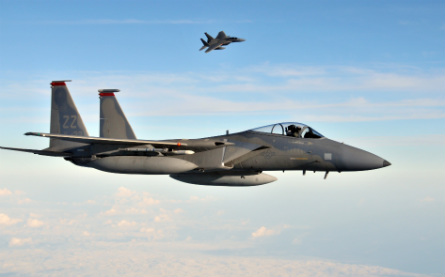Boeing has launched a four-year structural analysis of the US Air Force F-15 fleet, with the aim of doubling to quadrupling the service lives of the two major variants.
The USAF has also revealed new interest in critical avionics and mission system upgrades for the 40-year-old airframe, as it seeks to keep at least some of its 414 F-15C/D fighters and F-15E fighter/bombers flying for decades to come.
A USAF F-15C fighter has already entered a four-year fatigue test cycle at Boeing's factory in St Louis, Missouri, said Brad Jones, the company's director of F-15 development programmes. It will be joined soon by an F-15E Strike Eagle.
Boeing's tests will determine if the service life of the F-15C/D can be extended from 9,000h to 18,000h, Jones said. The service life of the F-15E was originally set at 8,000h but could potentially be raised to 32,000h after the tests are complete.
 |
|---|
© US Air Force |
If the USAF peacetime annual flight-hour average is set at 300h, the service life increase should keep both models flying for several more decades.
The fatigue tests will indicate possible sources of structural failures. Only four years ago, the USAF grounded its F-15Cs after a longeron failure caused one aircraft to disintegrate in flight. An investigation showed that longeron cracks were limited to a handful of F-15C/Ds, which were immediately retired.
The USAF is also considering a significant capability upgrade for the entire F-15 fleet. The aircraft now rely on three ageing systems for self-defence - the ALR-56C radar warning receiver, ALQ-135 jammer and ALE-45 countermeasures dispenser. On 20 November, the USAF issued a "sources sought" notice for a digital electronic warfare system.
Boeing is already proposing such a system developed by BAE Systems to export customers of the F-15 Silent Eagle.
The self-defence upgrade, which the USAF calls the eagle passive/active warning survivability system (EPAWSS), is included in the service's next five-year spending plan, but funding will not be assured until this year's final budget reviews are complete in January, Jones said.
If funded, the EPAWSS programme will follow USAF F-15 upgrades, including an active electronically scanned array radar and a new core processor, Jones said.
Preserving and upgrading the F-15 fleet would mark a sharp departure in USAF plans. Less than two years ago, Lockheed Martin officials talked openly of replacing the F-15E with the F-35A Lightning II.
Source: Flight International



